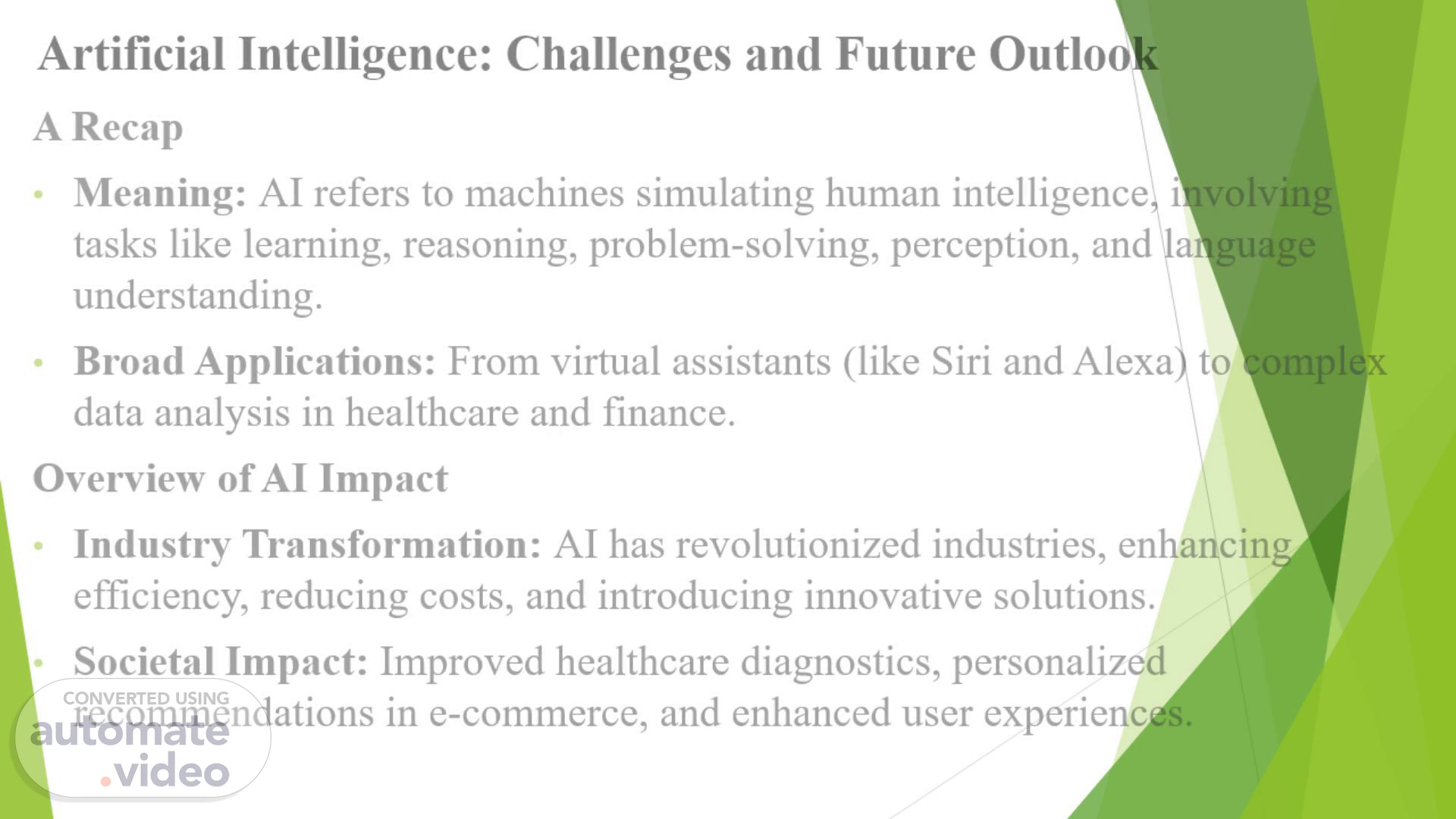
Page 1 (0s)
[Audio] Welcome, everyone, to our presentation on Artificial Intelligence: Challenges and Future Outlook. In this introductory slide, we'll explore the fundamentals of AI and touch upon its extensive applications across various industries. Artificial Intelligence, or AI, refers to machines emulating human intelligence, encompassing tasks like learning, reasoning, problem-solving, perception, and language understanding. From virtual assistants to complex data analysis in healthcare and finance, AI has become an integral part of our technological landscape. Let's move on to the next slide to delve into the impact AI has had on industries and society as a whole..
Page 2 (46s)
[Audio] As we venture into the challenges of AI on this slide, we'll address ethical concerns, technical hurdles, and the implications on the workforce. Ethical concerns arise from biases present in AI algorithms, leading to discriminatory outcomes. An example includes facial recognition systems exhibiting higher error rates for certain ethnic groups. Transparency and fairness are crucial to address these challenges. Technical hurdles involve the 'black box' nature of many deep learning models, making it challenging to understand their decision-making process. Additionally, ensuring AI systems are robust and adaptable to unforeseen circumstances poses a significant challenge. Workforce implications include concerns about job displacement due to automation. We'll also explore the need for retraining programs to equip the workforce with the skills required in the evolving job market, ultimately creating new opportunities..
Page 3 (1m 49s)
[Audio] Now, let's turn our attention to the future of AI. This slide will highlight the exciting trends and opportunities that lie ahead. Advances in AI research, such as improved natural language processing and the potential breakthroughs in quantum computing, are shaping the landscape. We'll discuss examples like OpenAI's GPT-4 and the profound impact these advancements can have on language generation and processing power. In healthcare, AI is positioned to revolutionize early disease detection, personalized treatment plans, and drug discovery. From analyzing medical data to tailoring treatment plans based on individual patient data, AI is becoming a powerful ally in the healthcare sector. Moreover, we'll explore how AI is not just replacing jobs but augmenting human capabilities, enhancing productivity, and aiding creativity in various fields. The future is indeed promising and filled with opportunities for collaboration between humans and AI..
Page 4 (2m 55s)
[Audio] As we move to the next slide, we'll discuss the strategies for a responsible AI future, addressing the need for regulation, collaboration, and continuous learning. Regulation and standards are crucial for ensuring the ethical development and deployment of AI. We'll touch upon examples such as GDPR in Europe and the principles set by organizations like IEEE. Collaboration between governments, industries, and academia is vital to address the challenges posed by AI. Successful collaborations have already shown the potential for responsible AI development and deployment. To ensure a smooth transition into an AI-driven future, continuous learning is essential. This involves ongoing education, upskilling, and industry-academic partnerships to bridge the skills gap and prepare the workforce for the evolving job market..
Page 5 (3m 52s)
[Audio] As we conclude our presentation, let's revisit the key takeaways and emphasize the importance of balancing progress and ethics in the development of AI. We've covered the challenges, explored future trends, and discussed strategies for a responsible AI future. It's crucial to find a harmonious balance between technological advancement and ethical considerations. As we chart the course ahead, remember that the journey with AI is ongoing and ever-evolving. I encourage each of you to actively engage in the responsible development and use of AI. Explore, adapt, and refine strategies as the field progresses. Thank you for your time and participation. If you have any questions or would like to continue the discussion, please feel free to reach out. Let's work together to shape a future where AI benefits us all responsibly..